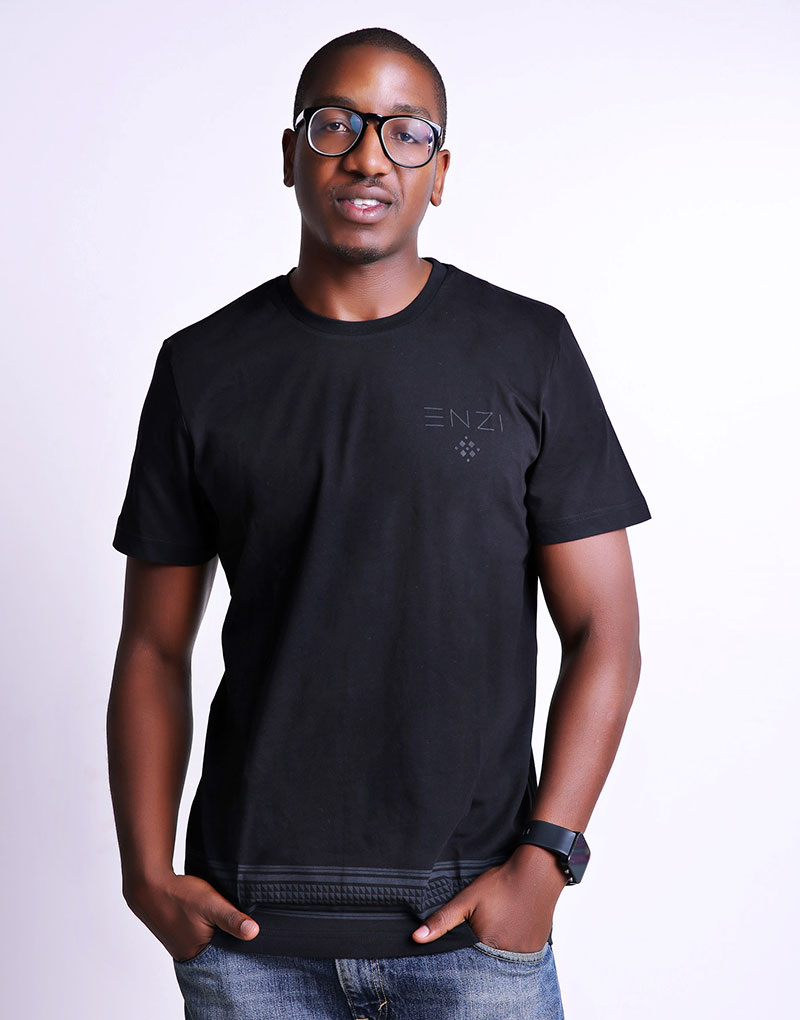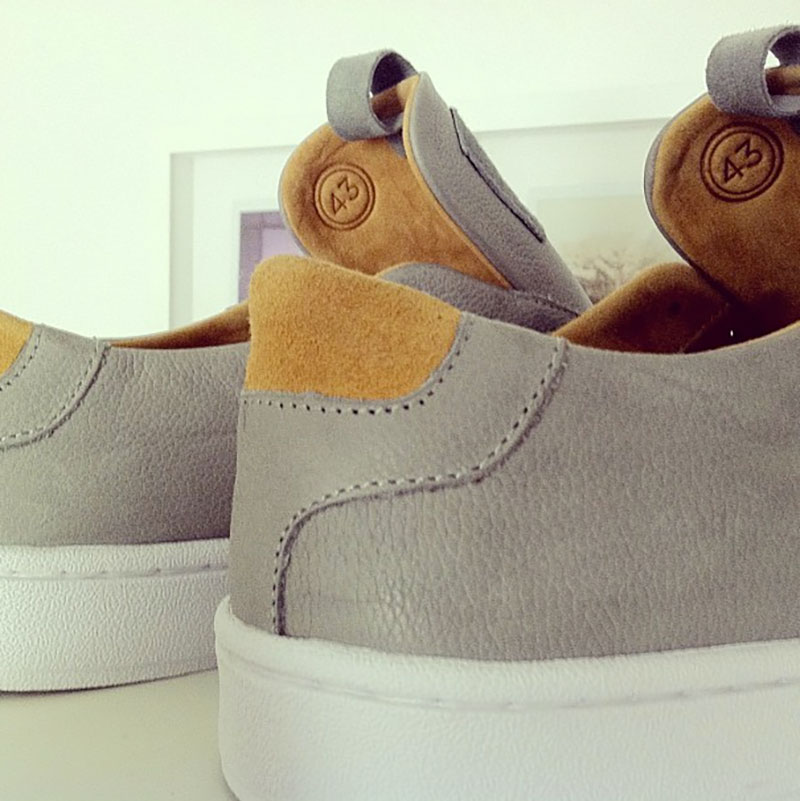Open a box of Enzi shoes and this is what you’ll read on the inside: You have not just purchased a pair of shoes.
You have contributed towards the development of sustainable leather production in Ethiopia. You have invested in improving the livelihoods of skilled Ethiopian factory workers. You have helped to raise the profile of East African design. You have added your voice to a growing chorus of people around the world who are ready to see Africa in a new light. The shoes also happen to be really nice. Enjoy them responsibly.
Founder, Sam Imende gives no further instructions on how to enjoy them responsibly, but one can imagine that it might have something to do with walking in someone else’s shoes or becoming more conscious of what you wear on your feet. Having “Made in Ethiopia” stamped on your sole might also be a good start. Long time friends Azariah Mengistu, Jawad Braye, Christian Ward and Imende (pictured above) spent their student days scattered around the world, returning to establish Enzi Footwear in their homeland Kenya.
Their travels had exposed them to luxury leather goods and they couldn’t see any obstacles as to why East Africa couldn’t produce leather goods to a similar standard. The Enzi team are still in their 30s and are driven to change the perceptions the world has of their part of the world. “Most people don’t think of Ethiopia as having the highest quality leather in the world, “ says Imende. “They think of stereotypes established decades ago.” “We saw a lot of potential, creativity and enterprise in the region,” he continues. “Jawad had studied footwear at the London School of Fashion and we decided to build a shoe brand that reflected the standards and quality we knew existed here.”
Africa is known as a resource rich region but much is exported and sold in to higher end markets without the source getting any recognition. Imende and his team set out to turn the spotlight back on Africa. Their neighbour, Ethiopia, seemed to offer the best manufacturing facilities with surprisingly good tanneries. The best thing about quality Ethiopian leather is how beautifully it ages and Enzi’s entry leather sneakers, starting at $125, are a serious fashion investment. Imende easily found the talent and excellence in Ethiopia to get their venture off the ground; indispensable artisans such as seamstresses and pattern cutters; but underestimated the need for a production line manager, someone to constantly supervise the overall quality.
If you’re selling shoes at a premium price into developed markets you need more than just a catchy “African tale.” Your products must be flawless. One of Imende’s survival strategies has been to collaborate with established companies. A French-Canadian company based in Ethiopia shared information on labels and soles with him and a factory in London was open to forming an incubator-type relationship with Enzi. One of the biggest incentives has been from the government itself. A long-time exporter of high-grade raw leather to Japan and Italy, the Ethiopian government wanted to retain a higher margin at home and introduced a tax of up to 150% on raw exports, whereas the export of finished goods attracts a tax of 0%.  From the start Kenzi has run their business in a way that creates social impact. Going beyond fair pay, they pay factory workers a percentage of profits and strive to operate a completely transparent supply chain. Imende has a background in microfinance and has considered ways in which the company can evolve into a lending circle for the benefit of workers.
From the start Kenzi has run their business in a way that creates social impact. Going beyond fair pay, they pay factory workers a percentage of profits and strive to operate a completely transparent supply chain. Imende has a background in microfinance and has considered ways in which the company can evolve into a lending circle for the benefit of workers.
A pop up shop they created in Nairobi saw 10% of proceeds going to school students who couldn’t afford their fees. “It’s been trendy for a while now to be green and integrate social enterprise into your business,” muses Imende. “But we’ve found that these types of considerations actually go hand-in-hand with delivering a quality product. For us, this should be the norm.”
The tannery Enzi works with recycles a lot of their water, and highly toxic chemical by-products, such as chrome, are being effectively filtered to avoid poisoning local waterways. Luckily, fashion trends have also swung onto a more natural aesthetic and the more natural leather treatments they use have become the norm. The touch and feel of Enzi shoes hasn’t been lost on their customer’s either, who value the authenticity of leather that hasn’t been pickled to death. Imende’s vision for a more sustainable business hasn’t been without its pitfalls.
“Many factory managers can’t understand why there should be any incentive for workers at all,” he says. “They expect the goods to be made to a workers best ability regardless of whether they will be paid more or not.” The retail industry works on slim margins and by default has low paying jobs. Imende has seen some workers leave to become housemaids because it paid more. India and China have also established large production factories around the capital Addis Ababa, taking advantage of the aforementioned tax breaks, adding to an increasingly crowded market.  Yet, despite the challenges it’s sometimes not monetary incentives that work with employees. “It’s about creating a cooperative ownership scheme and finding ways to make staff feel valued,” says Imende. “For example, on each box we send out, we have an employee sign their name, “as made by…” and they take a lot of pride in that. It’s their handcraft that’s being exported to London and Hong Kong and sometimes a subtle thing like this can go a long way in fostering loyalty and pride.” Richard Branson and brands such as Nike inspire Imende.
Yet, despite the challenges it’s sometimes not monetary incentives that work with employees. “It’s about creating a cooperative ownership scheme and finding ways to make staff feel valued,” says Imende. “For example, on each box we send out, we have an employee sign their name, “as made by…” and they take a lot of pride in that. It’s their handcraft that’s being exported to London and Hong Kong and sometimes a subtle thing like this can go a long way in fostering loyalty and pride.” Richard Branson and brands such as Nike inspire Imende.
“They both take a bit of risk and are very driven to build their brands,” he says. “The teams they work with are incredibly talented and I love the way they connect with consumers, particularly Nike’s relationship with athletes, skaters and musicians. You’ll occasionally see a campaign that looks completely off-brand, but they’re building a brand that really resonates with the market and pushes boundaries. They’re in touch with their end-user,” says Imende. Perhaps Enzi might take their slogan “Made in Ethiopia” one step further by adding “Pride Inside” to each of the boxes that now ship to Paris, London, Hong Kong, Sydney and New York.
What do you think? Is Africa “The Next Big Thing?” Comment below. To be notified of more stories like this, sign up for our free Weekly Words of Wisdom (WOW) emailer here




































